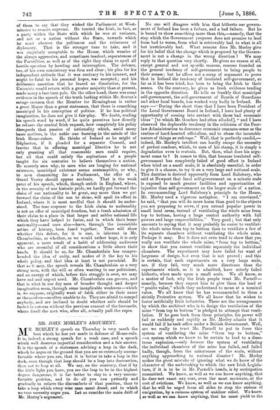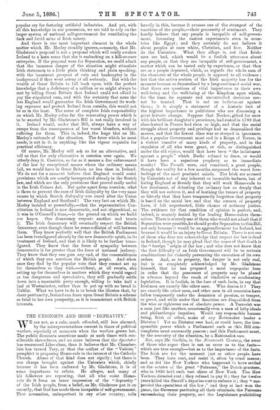MR. JOHN MORLEY'S ARGUMENT.
MR. MORLEY'S speech on Thursday is very much the best which lie has yet made in defence of Home-rule. It is, indeed, a strong speech for' a weak case, and a speech which well deserves impartial consideration and a fair answer. It is the speech of a, statesman- advising a leap in-the dark, which -he urges on the ground that: ou are so extremely uncom- fortable where' you are, that it 'better to take a leap in the dark, even though that leap should be a leap into destruotion, than not to leap at all. We say, on the contrary, -that if by the little light you have, you seethe leap to be in the highest degree dangerous, it is fart better to stay in -a very .uneom- fortable position, and to • do all you can -patiently and gradually to relieve -the discomfOrts, of that position, than to take a leap which every wise man !must dread, and to 'which no true• necessity urges yen. Let ns consider the main -drift.of Mr. Morley's argument. No one will disagree with him that hitherto our govern- ment of Ireland has been a failure, and a bad failure. But he is bound to show something _more than this,—namely, that the step which the Government proposes does not promise to lead from bad to worse, from what is retrievably bad to what is all but irretrievably bad. What reasons does Mr. Morley give for his belief that the change which is proposed- by the Govern- ment is not a change in the wrong direction ? We may reply to that question very shortly. He gives no reason at all, except general and not sp2cifie reasons, reasons founded on the general tendency of self-government to bring people to their senses ; but he offers not a scrap of argument to prove that in Ireland the tendency of insulated self-government, so far as it has been -tried, has been to bring the Irish to their senses. On the contrary, he gives us fresh evidence tending in the opposite direction. He tells us frankly that municipal self-government, the self-government of Boards of Guardians and other local boards, has worked very badly in Ireland. He says :—" During the short time that I have been President of the Local Government Board in Ireland, I have had plenty of opportunity of • coming into contact with those bad economic ideas" [to which Mr. Goschen had often alluded], " and I have observed the deplorable tendency in the criticism of the Poor- law Administration to denounce economic common-sense as the routine-of hard-hearted officialism, and to abuse the incurable nature of things as-red-tape." Well, that is perfectly candid,— indeed, Mr. Morleyrs intellect can hardly escape the necessity of perfect candour, which, to men of his stamp, it is simply a degradation even to restrain. But, then, what does his argu- ment come to It comes to this, that because insulated self- government has completely failed of good effect in Ireland when tried on a small scale, it is absolutely essential, in order to give it a chance, to try it on a very large and national scale. This doctrine is derived apparently from Lord Salisbury, who said at Newport that local self-government on a minute scale is exposed to much greater facilities and opportunities of injustice than self-government on the larger scale of a nation. In recommending Lord Salisbury's principle to the House, Mr. Morley used a vigorous metaphor. " I am convinced," he said, " that you will do more harm than good to the objects you are proposing to serve, if you extend popular power -in small local areas, instead of ventilating the whole mine from top to bottom, having a large central authority with hill powers and large responsibilities." Very good ; but that only amounts to saying that it may probably be easier to ventilate the whole mine from top to bottom than to ventilate a few of its separate chambers without ventilating the whole mine. Perhaps it may. But it does not even tend to show that you really can ventilate the whole mine, "from top to bottom," to show that you cannot ventilate separately the individual chambers. The experiment may have failed for want of largeness of design, but even that is not proved ; and this is certain, that such experiments on a very large scale, are, if they fail, very much more disastrous than the experiments which, as it is admitted, have utterly failed hitherto, when made upon a small •scale. We all know, as a matter of fact, why the Irish people trust Mr. Parnell— namely, because they expect him to give them the land at " prairie value," which they understand to mean at a nominal value. We all know that he has recommended to them a strictly Protective system. We all knew that he wishes to foster artificially Irish industries. These are the arrangements by which the architect who is to design the ventilation of the mine "from top to bottom " is pledged to attempt that venti- lation. If he goes back from these principles, his power will fail as suddenly and rapidly as Mr. Morley admits that it would fail if he took office under a British Government. Well, are we really to trust Mr. Parnell to put in force this system of ventilating the mine "from top to bottom," —a system which we know to be certain to lead to a disas- trous explosion,—only because the system of ventilating the individual chambers of the -mine has failed, and failed badly, though, from the minuteness of the scale, without anything approaching to national disaster ? Mr. Morley makes the great mistake of ignoring what we do know of the character of the undertaking to which the new Irish Legisla- ture, if it is to be in Mr. Parnell's hands, is by Anticipation committed. We know, as 'well as- we- can know anything, ihat he dare mob exact any rent, even the- most moderate, at the cost of evictions. We know, as well as we' can know anything, that he will be urged from all sides to stop the stream of -emigration, by a zninous.systeui of Autdeor relief. We know, as iveilas we. can •.knew anything, that he • mast yield to the
popular cry for fostering artificial industries. And yet, with all this knowledge in our possession, we are told to rely on the larger system of national self-government for ventilating the dark and foetid mine of Irish misery.
And there is one most important element in the whole matter which Mr. Morley steadily ignores,—namely, that Mr. Gladstone's proposal is not s proposal which will really awaken Ireland to a keen sense that she is embarking on a kill-or-cure enterprise. If the proposal were for Separation, we could admit that the immense danger of the situation might stimulate Irish statesmen to a little plain thinking and plain speaking, with the imminent prospect of ruin and bankruptcy in the background if they went astray at all seriously. But with the wealth of Great Britain to fall back upon, with the perfect knowledge that a deficiency of a million or so might always be met by telling Great Britain that Ireland could not afford to pay the stipulated sum, and with the certainty that none the less England would guarantee the Irish Government its work- ing expenses and protect Ireland from outside, this- would not be so in the least. The sense of complete Irish responsibility on which Mr. Morley relies for the renovating power which is to be exerted by Mr. Gladstone's Bill is not really involved in it. Ireland would, under that Bill, always have a way of escape from the consequences of her worst blunders; without suffering for them. This is, indeed, the huge blot on Mr. Morley's rationale of the situation. The force which he most needs, is not in it, in anything- like the vigour requisite for practical efficiency.
Of course, Mr. Morley will ask us for an alternative, and tell us that the only alternative is coercion over again. We utterly deny it. Coercion, so far as it means a due enforcement of the law by exceptional means where the ordinary means fail, we would have in Great Britain no less than in Ireland. We do not for a moment believe that England would resist provisions which are mostly incorporated already in the Scotch law, and which are the only provisions that proved really useful in the Irish Crimes Act. But quite apart from coercion, what is there to prevent the cure of Irish disloyalty by the very same causes by which Scotch disloyalty was cured after the Union between England and Scotland ? The very fact on which Mr. Morley insisted se powerfully,—that the representative Con- stitution in Ireland is now democratic, and not oligarchical, as it was in O'Connell's time,—is the ground on which we build our hopes. One democracy respects another and trusts it. The Irish democracy will eventually respect the British democracy, even though there-be some collision of willbetween them. They know perfectly well that the British Parliament has been transfigured already by the new democratic spirit, in its treatment of Ireland, and that it is likely to be further trans- figured. They know that the force of sympathy between democracies is far greater• than the force of national jealousy. They know that they can gain any end, of the reasonableness of which they can convince the British people. And, when once they find by the popular vote that they cannot set up for themselves as they wish,—without, at all events, also setting up for themselves in matters which they would regard as too dangerous and speculative, they will gradually settle down into a reasonable party enough, willing to take half a loaf at Westminster, rather than to put up with no bread in Dublin. What we have to do is to break •the illusion that, by sheer pertinacity, Ireland can force upon Great Britain a scheme aslatal to her own prosperity, as it is inconsistent with British interests.



































 Previous page
Previous page